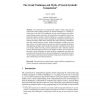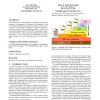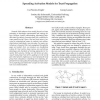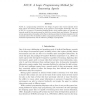988 search results - page 16 / 198 » SenseNet: A Knowledge Representation Model for Computational... |
NAACL
2010
13 years 5 months ago
2010
The question of how meaning might be acquired by young children and represented by adult speakers of a language is one of the most debated topics in cognitive science. Existing se...
DAGSTUHL
2008
13 years 9 months ago
2008
The construction of computational cognitive models integrating the connectionist and symbolic paradigms of artificial intelligence is a standing research issue in the field. The co...
WWW
2003
ACM
14 years 8 months ago
2003
ACM
The Sematic Web is vitally dependant on a formal meaning for the constructs of its languages. For Semantic Web languages to work well together their formal meanings must employ a ...
EEE
2004
IEEE
13 years 11 months ago
2004
IEEE
Semantic Web endeavors have mainly focused on issues pertaining to knowledge representation and ontology design. However, besides understanding information metadata stated by subj...
CORR
2004
Springer
13 years 7 months ago
2004
Springer
FLUX is a programming method for the design of agents that reason logically about their actions and sensor information in the presence of incomplete knowledge. The core of FLUX is...




